Key takeaways:
- Privacy advocacy empowers individuals to control their personal information, enhancing their sense of security and well-being.
- Sharing personal stories of vulnerability fosters community and motivates others to take proactive steps in protecting their privacy.
- Collaborative initiatives and regular engagement can amplify the impact of privacy advocacy efforts, driving awareness and support.
- Measuring engagement through both quantitative and qualitative feedback helps refine advocacy strategies and demonstrates real-life impact.

Understanding privacy advocacy
Privacy advocacy is rooted in the belief that individuals have the right to control their personal information. I remember a pivotal moment when I realized just how vital this was: a friend of mine shared a story of how her data was misused, leading to her feeling vulnerable and exposed. It struck me then that privacy isn’t just a concept; it’s a fundamental aspect of our well-being and security.
As I delved deeper into the realm of privacy, I found myself constantly questioning the status quo: How often do we sacrifice our privacy for convenience? At times, I felt overwhelmed by the complexity of data protection laws and the constantly evolving digital landscape. Yet, the more I researched, the clearer it became that educating oneself and others about their rights is an essential step toward meaningful advocacy.
Engaging with people about privacy often reveals surprising sentiments. I recall a workshop where participants expressed feelings of helplessness regarding their online presence. It reinforced my conviction that privacy advocacy is about empowerment—helping individuals reclaim their autonomy in an age where information is both abundant and fragile. Isn’t it inspiring to think that by raising awareness, we can help others take empowered steps to protect their digital lives?
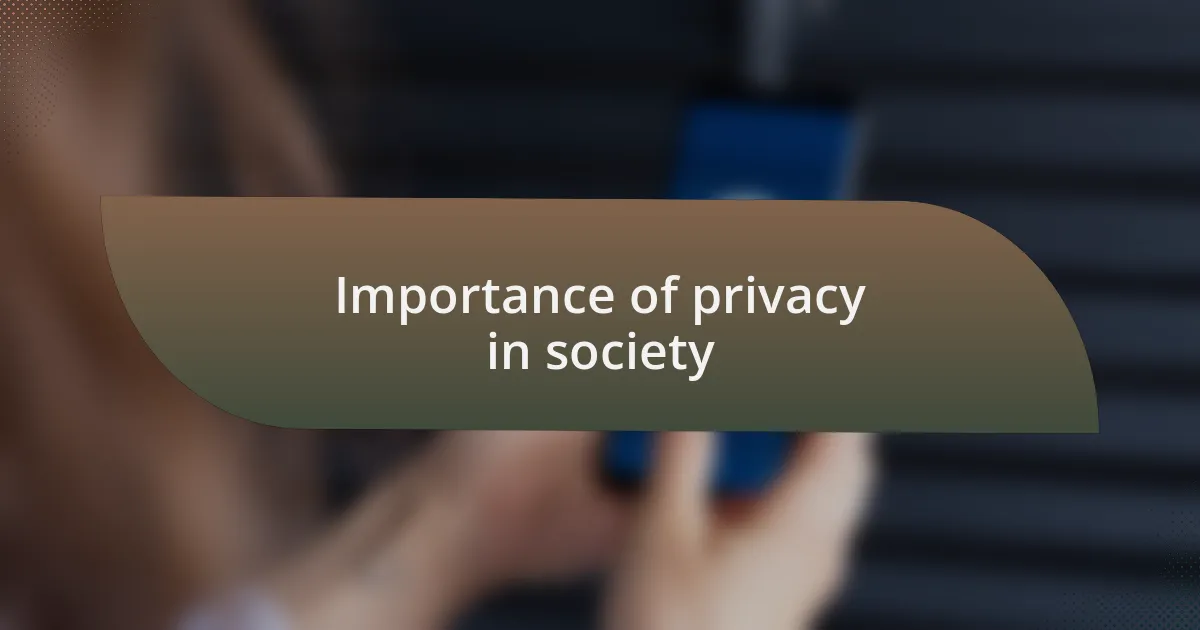
Importance of privacy in society
The importance of privacy in society cannot be overstated. I remember reading an article about a mass data breach that affected millions. The anxiety many felt over their personal information being exposed made me realize that privacy touches not just the individual but the communal sense of security. How can we feel safe when our experiences and identities are so readily accessible to others?
Consider this: every time we share personal information, we’re risking more than just our data; we’re risking our identities. I found myself reflecting on my own susceptibility when I accidentally shared too much in a group chat. It was a wake-up call, highlighting how easily our lives can become public when we let our guards down. Privacy is essential not just for protecting our personal lives but for maintaining our dignity in an increasingly surveillance-heavy world.
Moreover, privacy fosters trust among individuals and communities. I often think about my interactions with friends who become wary of sharing their thoughts and feelings online. If we lack the assurance that our voices will remain private, how can meaningful conversations thrive? Recognizing the foundational role of privacy in facilitating open dialogue is crucial for nurturing healthy societal relationships.
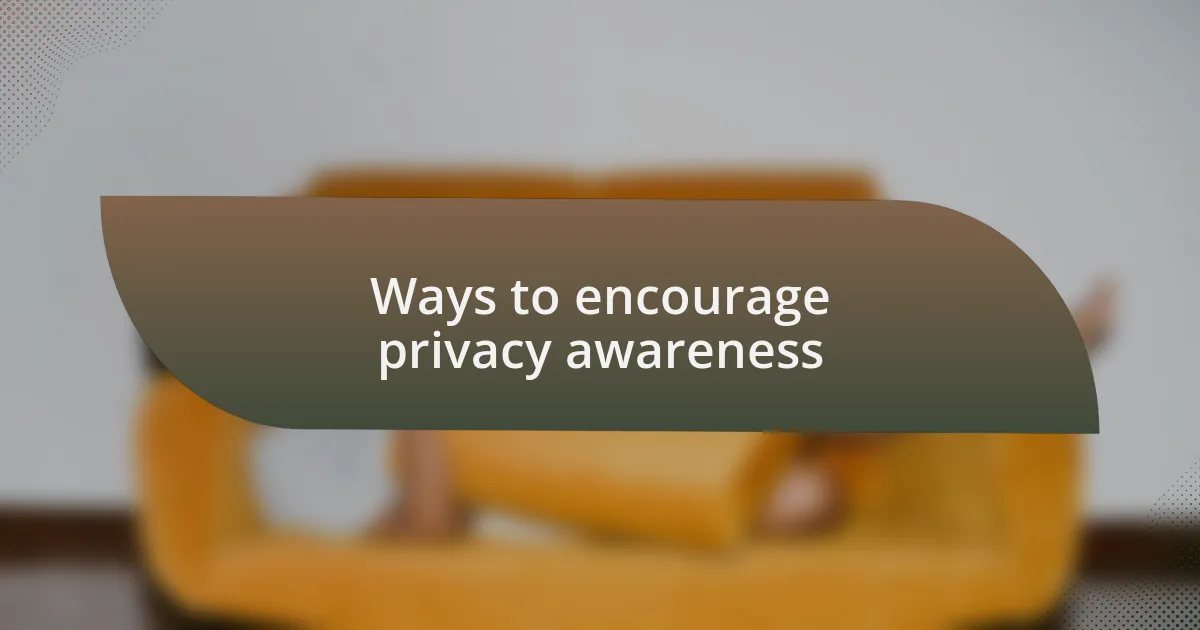
Ways to encourage privacy awareness
One effective way to raise privacy awareness is by sharing personal stories of vulnerability. I once felt exposed after a friend’s social media account was compromised, and it struck a chord in our group. Discussing our own close calls can reveal just how easily things can go awry and encourage others to be cautious with their information. When we connect on these personal levels, it makes the risks feel more real.
Hosting workshops or informal meet-ups can also be a powerful method to promote privacy advocacy. Just recently, I participated in a local event where we discussed data encryption and safe browsing practices. The atmosphere was collaborative, allowing everyone to share tips and tricks they had picked up. Seeing my peers engage actively not only deepened our understanding but also built a community focused on safeguarding our privacy together.
Lastly, I find that using relatable analogies can simplify complex privacy concepts. For instance, I often liken personal data to a key to our home. Would you leave your front door wide open for strangers? Asking these kinds of questions can ignite discussions and encourage individuals to think critically about their own online habits. Ultimately, fostering a mindset where everyone feels empowered to protect their privacy starts with these small, engaging conversations.
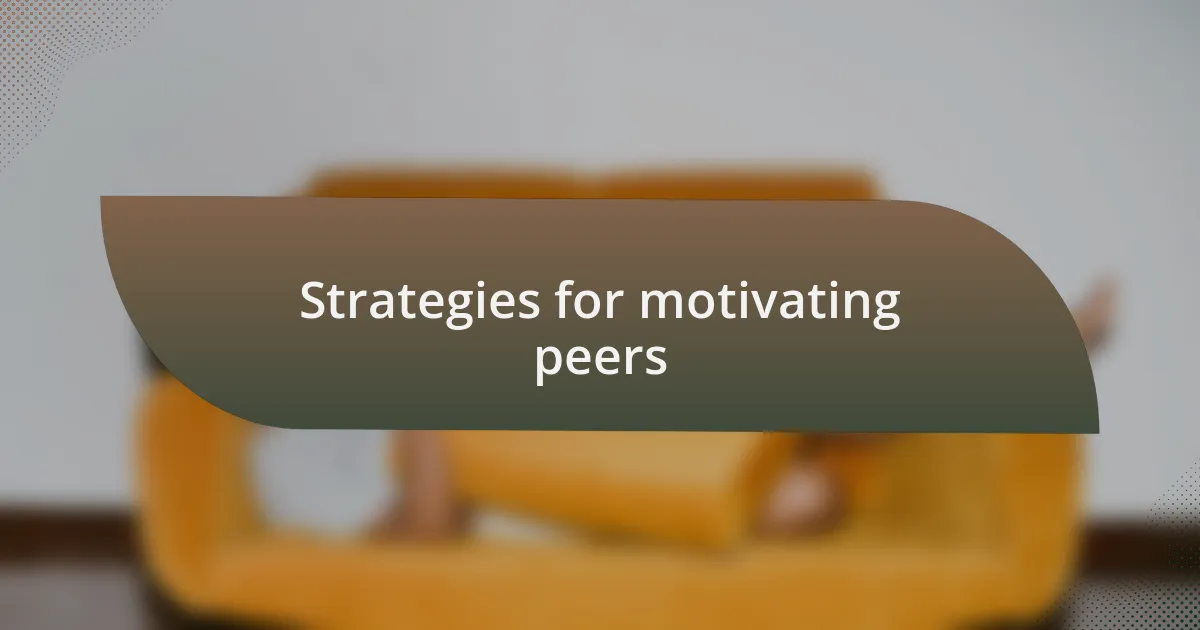
Strategies for motivating peers
One engaging strategy I’ve found effective is creating challenges that spark friendly competition. For example, I once organized a “Privacy Bingo” game among my peers, where we marked off actions like updating privacy settings or creating stronger passwords. The excitement of competing to complete the card not only made the topic fun but also fostered camaraderie, as we shared our progress and celebrated each other’s wins.
Moreover, I believe storytelling can be particularly motivating. During a group meeting, I recounted how a minor oversight in my digital life led to unexpected consequences. The vulnerability I shared made others reflect on their habits. When they realized how easily it could happen to anyone, a palpable shift occurred in the room—a collective highlight of the importance of being proactive about privacy.
Finally, I find that regular follow-ups can reinforce motivation. After discussing new privacy tools, I check in with my peers a week later to see how they’re implementing those practices. This simple act not only shows that I care but also keeps the conversation alive. It’s one thing to talk about privacy; it’s another to actively support each other as we strive to improve our awareness and actions.
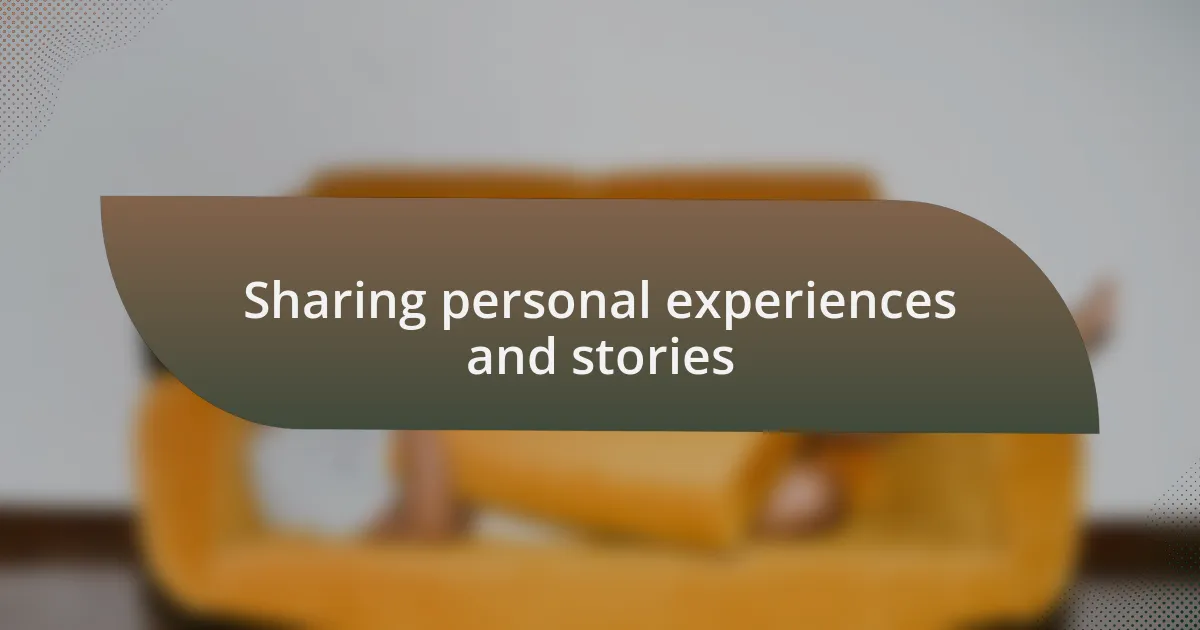
Sharing personal experiences and stories
Sharing personal experiences is a powerful tool for motivating others, especially in a field like privacy advocacy. I remember a time when I faced the repercussions of neglecting my digital safety. A simple click on what seemed like a harmless link led to my personal information being compromised. That experience stirred a real emotional response; I felt vulnerable and anxious. When I shared this story, my peers’ eyes widened—suddenly, my caution became their reality.
Another memorable moment involved a friend who had a particularly tech-savvy family member. She shared that this relative had taught her the importance of regularly monitoring her online presence. Inspired by her narrative, I asked about how that knowledge impacted her sense of security. Witnessing her realization—how sharing stories could encourage a proactive mindset—highlighted the importance of our conversations regarding privacy.
Engaging storytelling can foster a sense of community. When I shared my journey of learning about privacy tools, I noticed a ripple effect. Others started to open up about their experiences, leading to an enriching discussion. Isn’t it fascinating how one person’s vulnerability can spark a collective commitment to change? When we weave our personal tales into the fabric of these discussions, we not only engage but also empower ourselves and those around us.
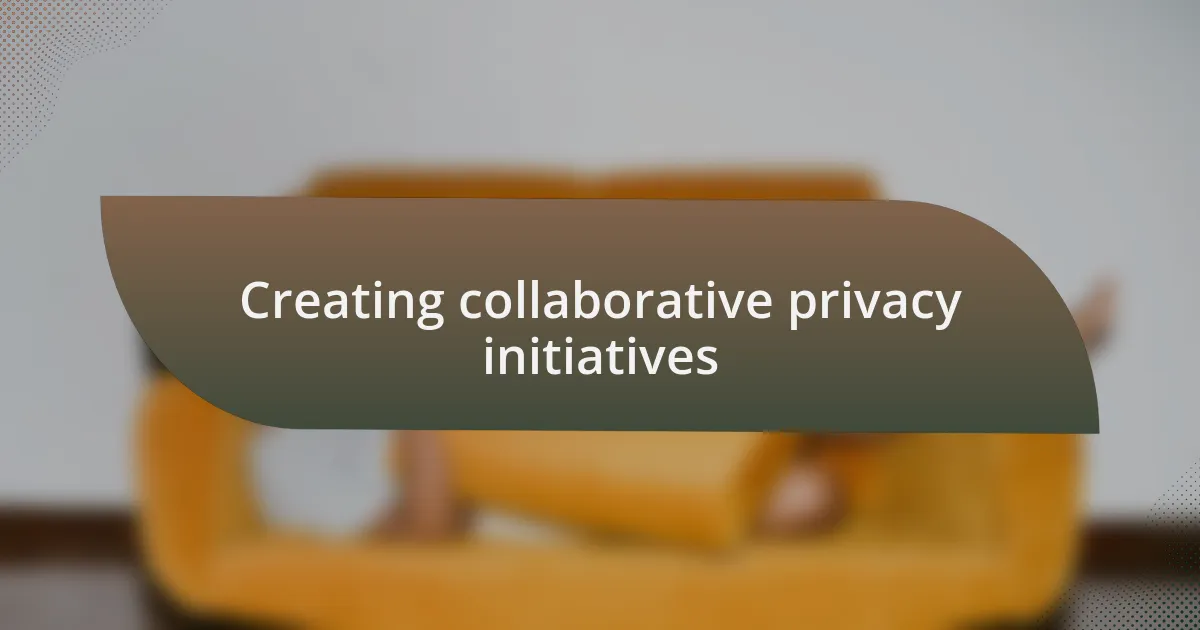
Creating collaborative privacy initiatives
Creating collaborative privacy initiatives requires more than just sharing knowledge; it’s about building relationships grounded in trust and shared values. I vividly recall a workshop where we brainstormed ideas to safeguard our online identities. Each participant brought their unique perspective, transforming our dialogue into a collaborative effort. I noticed how the synergy among us ignited a passion for proactive privacy measures. Have you ever experienced that moment when a group effort exceeds individual contributions?
During a community meeting, I suggested forming a local privacy coalition that could regularly share resources and strategies. I was surprised at how quickly people embraced the idea. They were eager not just to listen, but to contribute creatively. By combining our varied skills—from tech expertise to communication skills—we developed initiatives like informative newsletters and awareness campaigns. Why shouldn’t we leverage each other’s strengths to create a safer digital space?
I find that when we come together for a common cause, our collective energy can be a force for change. I often reflect on a project where we invited local businesses to participate in privacy workshops. The collaboration felt electric as we shared insights and experiences. This not only elevated our understanding but also cultivated a lasting network of privacy advocates. What if we could harness this momentum further? The possibilities are endless when we unite in this mission.
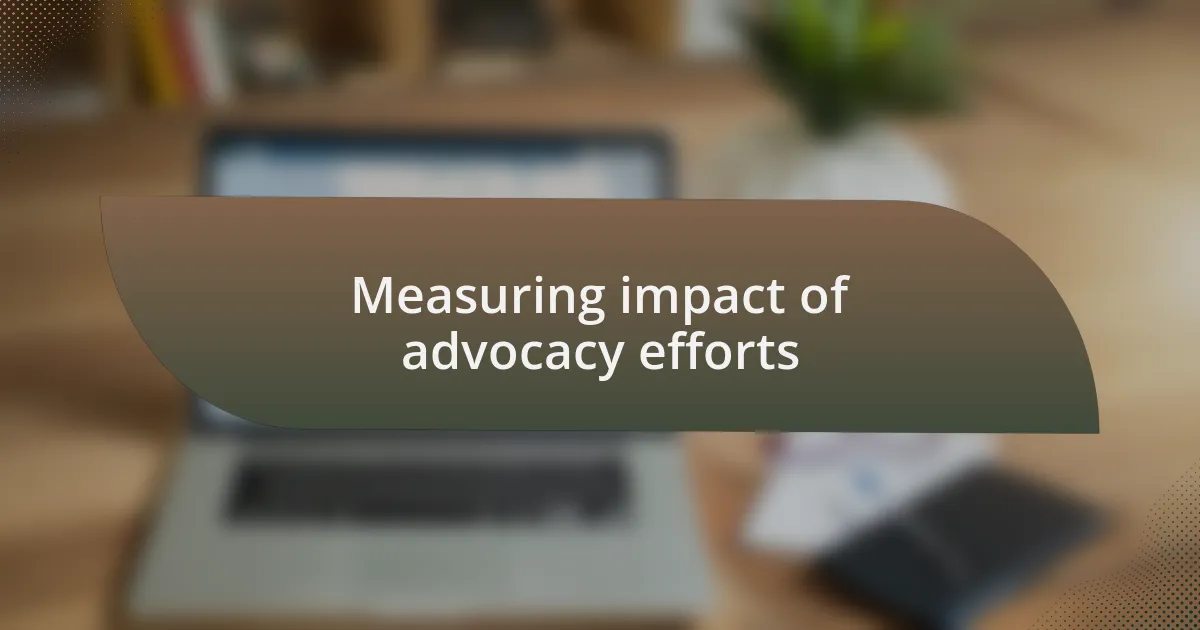
Measuring impact of advocacy efforts
Measuring the impact of advocacy efforts can be quite enlightening. I recall a time when we launched a campaign to educate our community about data privacy rights. We decided to track engagement through metrics like attendance at events and interactions on social media. The excitement I felt analyzing those numbers was palpable, as it reflected not just participation, but growing awareness among our peers.
Sometimes, qualitative feedback can be even more telling than statistics. At one event, a participant shared how our initiative changed their perspective on online safety. Hearing their story reminded me that advocacy isn’t just about numbers; it’s about real lives being influenced. Have you ever had someone tell you that your efforts made a difference? Those moments fuel our passion, showing clearly that we are on the right track.
Regularly revisiting our goals and outcomes helped us refine our strategies. I remember convening our team to review what worked and what didn’t. It was during these discussions that we unearthed valuable insights, such as the importance of tailoring our messages to resonate with different audiences. Reflecting on this adaptability, I realized that true impact lies in our willingness to learn and evolve. What if we consistently asked ourselves how we can improve? That, I believe, is the key to sustained advocacy success.